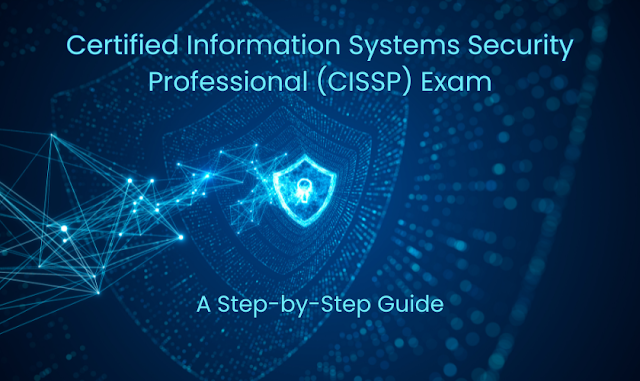A Step-by-Step Guide to Preparing for the Certified Information Systems Security Professional (CISSP) Exam
Are you considering a career in information security or looking to advance your existing one? The Certified Information Systems Security Professional (CISSP) certification is a globally recognized credential that can open doors to exciting opportunities in the cybersecurity field. However, passing the CISSP exam can be a challenging task. In this step-by-step guide, we'll walk you through the process of preparing for and succeeding in the CISSP exam.
Step 1: Understand the CISSP Exam
Before you embark on your CISSP journey, it's essential to understand the basics of the exam. The CISSP exam consists of 250 multiple-choice questions, covering various domains within information security, and takes approximately 6 hours to complete. These domains include Security Architecture and Engineering, Security and Risk Management, Identity and Access Management, Asset Security, Communication and Network Security, Security Assessment and Testing, Security Operations, and Software Development Security.
Step 2: Meet the CISSP Eligibility Requirements
To be eligible for the CISSP exam, you must have at least five years of professional work experience in at least two of the eight CISSP domains. If you don't have the required work experience, you can still sit for the exam by obtaining an (ISC)² Associate designation, which is granted to those who pass the exam and then gain the required work experience within six years.
Step 3: Study Materials and Resources
The next step is to gather the necessary study materials and resources. Consider investing in official CISSP study guides, practice exams, and training courses. (ISC)², the organization that administers the CISSP exam, offers official study materials. Additionally, there are numerous books, online courses, and study groups available.
Step 4: Create a Study Plan
A well-structured study plan is crucial for success. Break down your study schedule into manageable parts. Assign dedicated time each day or week to cover specific domains and topics. Make use of study aids like flashcards, practice questions, and note-taking to reinforce your learning.
Step 5: Practice, Practice, Practice
Practice exams are your best friend when preparing for the CISSP exam. They help you get accustomed to the format of the questions and improve your time management skills. There are numerous online resources and books that provide practice exams. Make sure to review your answers and understand the reasoning behind them.
Step 6: Join Study Groups
Studying with peers can be incredibly helpful. Consider joining or forming a CISSP study group where you can discuss complex topics, ask questions, and learn from one another's experiences. These groups can provide insights and motivation.
Step 7: Register for the Exam
Once you feel confident in your knowledge and have consistently been scoring well on practice exams, it's time to register for the CISSP exam. You can do this through the (ISC)² website or Mockcertified where you will find all the related information about CISSP and several other cyber security management program certification exam courses..
Step 8: Exam Day
On the day of the exam, arrive early, stay calm, and manage your time wisely. Remember that the CISSP exam is challenging, and it's normal to find some questions difficult. Do your best and stay focused.
Step 9: Post-Exam and Continuing Education
After taking the exam, you'll receive a pass or fail result immediately. If you pass, congratulations! If you don't, don't be discouraged. You can retake the exam.
Once you pass, you must maintain your CISSP certification by earning Continuing Professional Education (CPE) credits. Stay current with the latest developments in the field to ensure your certification remains valuable.
FAQs: Preparing for the CISSP Exam
1. What is the passing score for the CISSP exam?
The CISSP exam is scored on a scale of 1,000 points, and you need to score at least 700 points to pass. It's important to note that the exact passing score may vary slightly due to the adaptive nature of the exam.
2. How much does it cost to take the CISSP exam?
The exam fee for the CISSP can vary depending on your location and whether you are an (ISC)² member. The standard CISSP exam fee is around $750. However, it's a good idea to check the official (ISC)² website for the most up-to-date pricing information.
3. How long should I study for the CISSP exam?
The amount of time required to prepare for the CISSP exam can vary depending on your background and experience. On average, candidates spend 3-4 months of dedicated study to adequately prepare for the exam. However, it's essential to focus on understanding the material thoroughly rather than rushing through it.
4. What is the (ISC)² Associate designation, and how does it work?
The (ISC)² Associate designation is available for individuals who pass the CISSP exam but lack the required work experience. They have six years to gain the necessary experience to become fully certified. This allows those who are new to the field to prove their knowledge and commitment.
5. Are there any prerequisites for taking the CISSP exam?
Yes, there are prerequisites. To qualify for the CISSP exam, you need at least five years of cumulative, paid, full-time work experience in at least two of the eight CISSP domains. If you don't meet these requirements, you can still sit for the exam as an (ISC)² Associate.
6. What is the format of the CISSP exam?
The CISSP exam consists of 250 multiple-choice questions and is computer-based. You have up to six hours to complete it. The exam covers various domains related to information security.
7. How often is the CISSP exam updated, and how do I stay current?
The CISSP exam is periodically updated to reflect the evolving field of information security. To stay current, CISSP-certified professionals must earn Continuing Professional Education (CPE) credits by attending relevant training, conferences, and educational activities.
8. What is the best way to approach the practice exams during preparation?
Practice exams are an integral part of your preparation. Take them seriously, review your answers, and focus on understanding the concepts behind the questions. Use practice exams to identify areas where you need improvement and prioritize your study accordingly.
9. Can I retake the CISSP exam if I fail on the first attempt?
Yes, you can retake the CISSP exam if you do not pass on your first attempt. (ISC)² allows you to retake the exam after a waiting period, which may vary based on your results. You can retake it as many times as needed to pass.
10. What is the value of the CISSP certification in the job market?
The CISSP certification is highly regarded in the job market. It can open up numerous career opportunities and often leads to better job prospects and higher salaries in the field of information security.
In conclusion, earning your CISSP certification can be a rewarding experience, but it requires dedication and a well-structured study plan. Follow these steps, stay persistent, and you'll be well on your way to becoming a Certified Information Systems Security Professional. Good luck on your CISSP journey!




Comments
Post a Comment